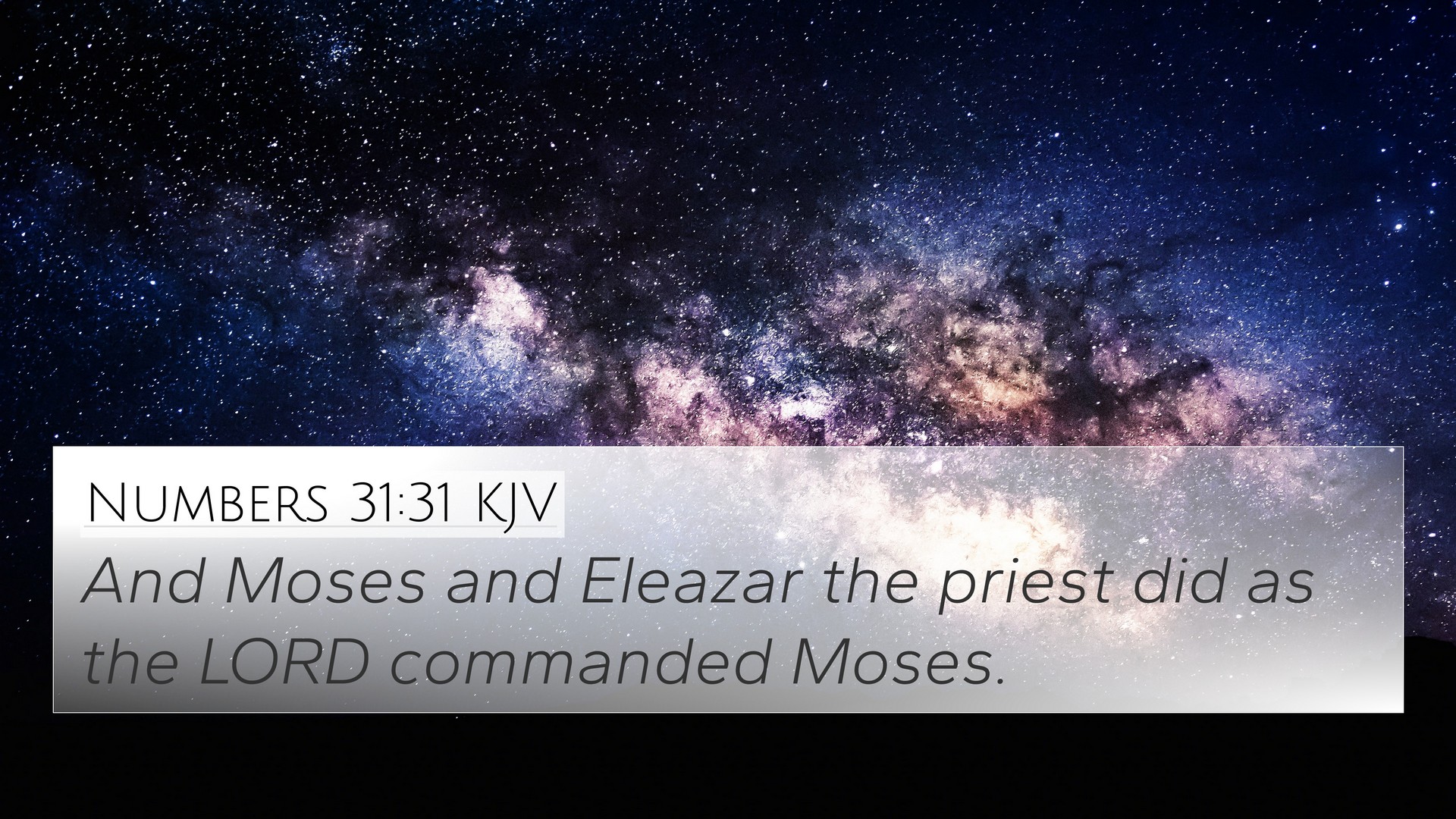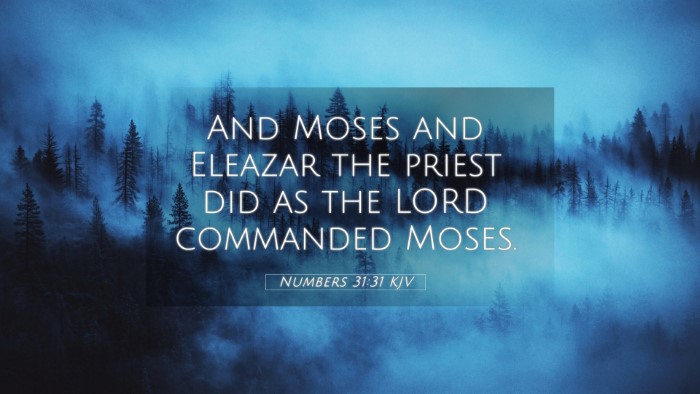Understanding Numbers 31:31
Bible Verse: Numbers 31:31 - "And Moses and Eleazar the priest did as the Lord commanded Moses, and they divided the prey among the people." This verse serves as a significant moment in Israel's history, raising themes of obedience, division of spoils, and priestly duties which are essential for understanding the narrative of the Israelites.
Summary of Meaning
The verse encapsulates the responsibilities given to Moses and Eleazar after the battle against the Midianites, highlighting their adherence to divine instructions. It shows the intertwining of leadership and religious governance through the characters of Moses and Eleazar.
Insights from Commentaries
- Matthew Henry: Emphasizes obedience and the importance of following God's commands. Moses and Eleazar's actions illustrate a faithful response to divine directives. The division of the spoil reflects stewardship, reinforcing the idea that all resources belong to God and are to be distributed justly among the people.
- Albert Barnes: Focused on the procedural aspect of dividing the spoils, linking it to the laws that God set forth. The commentary highlights how the leadership of Moses and Eleazar illustrates a continuity of commandment adherence, suggesting that God's principles govern everyday actions, even in matters of war and spoils.
- Adam Clarke: Offers a deep dive into the socio-religious implications of the spoils' division, arguing that it reinforces the social order within Israel. Clarke's commentary discusses the role of the priesthood in mediating between God and the people, especially relevant in the context of the spoils from the battlefield.
Inter-Biblical Connections
Numbers 31:31 can be contrasted and compared with several other scriptural passages that illuminate themes of obedience, leadership, and community ethics.
- Exodus 12:35-36: The Israelites' obedience in preparing for their exodus parallels the obedience depicted in Numbers 31:31.
- 1 Samuel 15:22: Highlights the importance of obedience to God's commands as a central theme in biblical leadership.
- Romans 13:1: Discusses the role of established authorities and their duty to follow God's will, similar to Moses and Eleazar.
- Hebrews 7:14: Relates to the lineage of the priesthood, emphasizing the responsibilities of priests, akin to Eleazar's role in the division of spoils.
- Matthew 25:14-30: Jesus' parable of the talents reflects the principle of stewardship and the proper handling of resources, akin to the division of the spoil in Numbers 31.
- Luke 16:10: Emphasizes faithfulness in handling small matters is directly related to handling greater responsibilities, similar to the division of spoils after war.
- 2 Corinthians 9:6-7: Discusses the principles of generosity and sharing resources, resonating with the outcomes of the spoils' division.
- Galatians 6:7: Stresses reaping what one sows, similar to distributing rewards from obedience in battle.
- Philippians 3:8: Paul speaks of counting all things as loss for the sake of Christ, relating to the priorities observed in the distribution of spoils symbolizing God's grace.
Comparative Bible Verse Analysis
The act of dividing the spoils among the people after a battle is not just about physical belongings but serves as a theological point on how God provides and how leaders are to exhibit justice and equity.
Thematic Connections Between Bible Verses
As we analyze Numbers 31:31, we observe various themes emerge, particularly focusing on obedience to God and the societal structures within His covenant community:
- Obedience: The principle of obeying God's commands is a theme present throughout the scriptures, seen in the laws given to the Israelites and echoed in the New Testament's call for believers to act righteously.
- Stewardship: The distribution of spoils reflects God’s provision for His people, emphasizing a broader theme of stewardship found throughout scripture.
- Community Ethics: The communal sharing of spoils teaches about collaboration and mutual support, a theme prevalent in the early church as described in Acts.
- Leadership: Moses and Eleazar's roles illustrate the importance of godly leadership, which is a recurring motif when studying biblical leaders and their responses to God's directives.
Tools for Bible Cross-Referencing
Utilizing a Bible concordance or a cross-reference Bible study guide allows believers to investigate connections and different dimensions of biblical texts effectively. Tools such as:
- Bible Cross-Reference Guide: Helps in identifying relevant scripture that pertains to a specific verse.
- Bible Chain References: Detailed connections that flow from one verse to another can illuminate deeper understanding.
- Comprehensive Bible Cross-Reference Materials: Books and resources designed to provide exhaustive cross-references for thorough biblical research.
Conclusion
Numbers 31:31 serves not only as a historical account but also as a rich resource for exploring themes of obedience, stewardship, and community within the biblical narrative. The interplay between Moses and Eleazar underscores the integral roles of leadership in God's plan. By utilizing cross-referencing tools, one can unlock the interconnectedness of the scriptures, leading to a more profound understanding of God's Word and how it applies to the believer's life.


